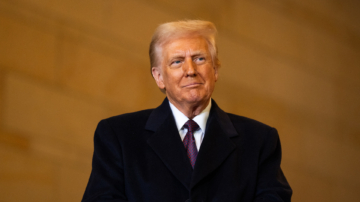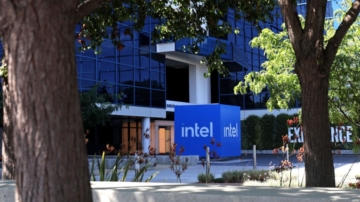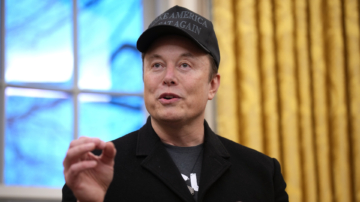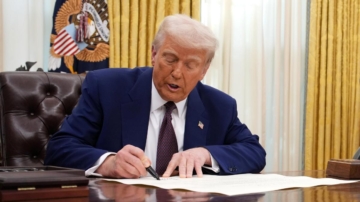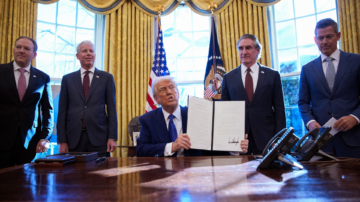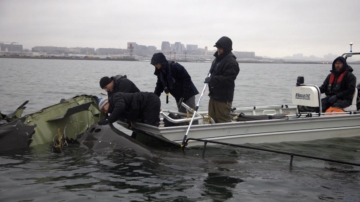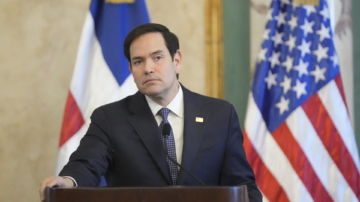【新唐人2011年8月1日訊】美國提高「國債上限」的最後期限還有兩天之際,7月31號,美國總統歐巴馬稱,民主黨與共和黨達成協議,同意削減赤字,避免債務違約。這可以說讓中共長長舒了一口氣。因為有專家分析說,在這場美國國債危機中,一旦美國違約,中共當局實際上是自願被劫持,立場非常尷尬。
作爲美國國債的最大海外債主,中國目前擁有近3.2萬億美元的外匯儲備,將會非常頭疼。截至今年5月,中國持有美國國債達1萬多億美元。美國一旦出現債務違約,中國的損失無疑將最為慘重。
對此,中共喉舌媒體《新華社》日前在網站連續發表評論文章,指責美國「綁架」了全球的經濟。
美國南卡羅萊納大學艾肯商學院教授謝田:「美國國債在國際上是公開發行,公開拍賣的。那所有的國家呢,不是說美國的政府或者是美國的軍隊逼著任何國家來買。任何個人也好,團體也好,國家也好都可以自己來認購。所以美國「綁架」這一說呢,我想沒有一個國家會這樣認爲。」
到目前為止,中共主要領導人還沒有就美國國債談判出現的僵局作出正式表態。但《法新社》報導指出,《新華社》的評論表達出中共當局對中國經濟影響的擔憂。
謝田:「如果美國一旦違約的話呢,美國公債的價格必然下跌,這樣中國持有美國公債的價值就會下跌,中國就會遭受巨大的損失。所以說中國的經濟被綁架是從這一角度考慮的。但實際上這是中國(中共)政府自己的決定,願意被綁架在美國的公債和美國政府的決策身上,因爲並沒有任何人強迫你這樣做。」
有專家表示,由於中國的出口型經濟造成對美元依賴,使得中共在這場危機中立場非常尷尬,並沒有太大的選擇餘地。
「傳統基金會」專家史劍道認爲,由於對美國的依賴,中共不能發出任何威脅。要長期解決這個問題,中國必須改變經濟發展模式,減少對美國的依賴。
而「上海復旦大學」美國研究中心主任瀋丁力教授表示,《新華社》等中共喉舌媒體單方面的指責,並無益於減輕中國經濟面臨的壓力。中國(中共)當局既然長期採用投資美國國債回報盈利的政策,就必須為可能出現的後果負責。
謝田:「中共在截流外匯的時候,強制結匯的時候呢,把相當於3萬億美元的錢投入了中國市場,這樣才造成了我們今天所看到的廣泛而持久的通貨膨脹。所以這個做法對中國人民沒有甚麽好處,但實際上是中共既得利益集團他們得到了好處。他們成功把資產轉移到了海外,他們可以無所顧忌的劫取國庫。」
《紐約時報》日前報導,一旦「標普指數」作出不利於美國國債的評級,中國所持美國國債的損失將預計高達20%至30%。也就是,以中國近1.16萬億的美國國債數額計算,即便最低下跌20%,損失也將高達2304億美元,相當於中國人均虧損177美元。
新唐人記者劉惠、李明飛、周天採訪報導。
CCP is Voluntarily Hijacked
On July 31, U.S. President Obama announced the agreement
of the bipartisan congress
to raise the U.S. national debt ceiling and reduce its deficit.
This has allowed the Chinese communist regime (CCP)
to relax a bit, because as per experts,
amidst the U.S. debt crisis, once the U.S. is in default,
the CCP is actually voluntarily “hijacked”.
August 2 is the deadline for the U.S.
to raise its $14.3 trillion national debt's ceiling.
If the bipartisan congress fails to reach a compromise,
the U.S. government has to
either delay the interest payments on its national debts
or defer payments on its accounts payable.
Both would create non-ignorable damages to its economy.
As the largest overseas holder of the U.S. debts,
China so far owns nearly US$3.2 trillion in foreign reserves.
As of May 2011, China held U.S. national debts
worth over USD 1 trillion.
Once the U.S. is in default,
China's losses will be inevitably large.
For this reason,
the CCP's mouthpiece Xinhua News Agency
has recently published articles on its website,
criticizing the U.S. for “hijacking” the global economy.
Xie Tian, a business professor at University of South Carolina:
The U.S. national debts are openly auctioned internationally.
No one is forced by the U.S. government to buy them.
Any individuals, groups and nations can purchase the debts.
So, no country would believe in the saying that
the U.S. “hijacked” the global economy.
So far, the key CCP leaders have not officially spoken of
the deadlock in the U.S. debt ceiling negotiations.
However, AFP said that Xinhua's commentaries revealed that
the CCP authorities are deeply concerned about
the impact of a U.S. default on Chinese economy.
Xie Tian: In case the U.S. is in default,
the price for the U.S. Treasuries securities will certainly fall.
The value of the U.S. securities China holds will decline.
As a result, China will suffer a huge loss.
The so-called hijacking Chinese economy
was based on this.
Nevertheless, it is the CCP regime that is voluntarily
“hijacked” by the U.S. Treasuries securities.
Nobody forced the CCP regime to do so.
Experts said, because its export-oriented economy
caused China to rely on the U.S. dollars,
the CCP government has been put to a very awkward position
during this crisis, without too many options to take.
Derek Scissors is an economic policy expert
from the U.S. Heritage Foundation.
He said that the CCP cannot give any threats
due to its dependency on the U.S.
In order to solve this problem in the long run,
China must change its economic development pattern,
thus reducing its dependency on the U.S.
Shen Dingli, a professor from the Center for American Studies
at Fudan University said,
the unilateral accusation from the CCP's Xinhua
doesn't help in alleviating the pressure on Chinese economy.
Since the Chinese government has long adopted the policy of
investing on the U.S. Treasuries securities for profits,
it must be prepared to undertake any possible consequences.”
Professor Xie Tian: “When the CCP authorities forcibly
settle the foreign exchanges with RMB,
it pours nearly US$3 trillion worth of RMB
into the Chinese market.
This has caused the rampant inflation in China today.
So, the CCP's actions don't provide any benefits
to the Chinese people.
However, the CCP's vested interest groups do benefit.
They have successfully transferred the assets overseas.
They have easily 'robbed' the national treasury.”
New York Times recently reported that once S&P gives
an unfavorable rating on the U.S. national securities,
the loss to the U.S. securities that China is holding
can be as high as 20% to 30%.
In other words, for debts of US$1.16 trillion
the losses would be as high as US$230.4 billion.
The Chinese people would lose
nearly US$177 per capita.
NTD reporters Liu Hui, Li Mingfei and Zhou Tian
作爲美國國債的最大海外債主,中國目前擁有近3.2萬億美元的外匯儲備,將會非常頭疼。截至今年5月,中國持有美國國債達1萬多億美元。美國一旦出現債務違約,中國的損失無疑將最為慘重。
對此,中共喉舌媒體《新華社》日前在網站連續發表評論文章,指責美國「綁架」了全球的經濟。
美國南卡羅萊納大學艾肯商學院教授謝田:「美國國債在國際上是公開發行,公開拍賣的。那所有的國家呢,不是說美國的政府或者是美國的軍隊逼著任何國家來買。任何個人也好,團體也好,國家也好都可以自己來認購。所以美國「綁架」這一說呢,我想沒有一個國家會這樣認爲。」
到目前為止,中共主要領導人還沒有就美國國債談判出現的僵局作出正式表態。但《法新社》報導指出,《新華社》的評論表達出中共當局對中國經濟影響的擔憂。
謝田:「如果美國一旦違約的話呢,美國公債的價格必然下跌,這樣中國持有美國公債的價值就會下跌,中國就會遭受巨大的損失。所以說中國的經濟被綁架是從這一角度考慮的。但實際上這是中國(中共)政府自己的決定,願意被綁架在美國的公債和美國政府的決策身上,因爲並沒有任何人強迫你這樣做。」
有專家表示,由於中國的出口型經濟造成對美元依賴,使得中共在這場危機中立場非常尷尬,並沒有太大的選擇餘地。
「傳統基金會」專家史劍道認爲,由於對美國的依賴,中共不能發出任何威脅。要長期解決這個問題,中國必須改變經濟發展模式,減少對美國的依賴。
而「上海復旦大學」美國研究中心主任瀋丁力教授表示,《新華社》等中共喉舌媒體單方面的指責,並無益於減輕中國經濟面臨的壓力。中國(中共)當局既然長期採用投資美國國債回報盈利的政策,就必須為可能出現的後果負責。
謝田:「中共在截流外匯的時候,強制結匯的時候呢,把相當於3萬億美元的錢投入了中國市場,這樣才造成了我們今天所看到的廣泛而持久的通貨膨脹。所以這個做法對中國人民沒有甚麽好處,但實際上是中共既得利益集團他們得到了好處。他們成功把資產轉移到了海外,他們可以無所顧忌的劫取國庫。」
《紐約時報》日前報導,一旦「標普指數」作出不利於美國國債的評級,中國所持美國國債的損失將預計高達20%至30%。也就是,以中國近1.16萬億的美國國債數額計算,即便最低下跌20%,損失也將高達2304億美元,相當於中國人均虧損177美元。
新唐人記者劉惠、李明飛、周天採訪報導。
CCP is Voluntarily Hijacked
On July 31, U.S. President Obama announced the agreement
of the bipartisan congress
to raise the U.S. national debt ceiling and reduce its deficit.
This has allowed the Chinese communist regime (CCP)
to relax a bit, because as per experts,
amidst the U.S. debt crisis, once the U.S. is in default,
the CCP is actually voluntarily “hijacked”.
August 2 is the deadline for the U.S.
to raise its $14.3 trillion national debt's ceiling.
If the bipartisan congress fails to reach a compromise,
the U.S. government has to
either delay the interest payments on its national debts
or defer payments on its accounts payable.
Both would create non-ignorable damages to its economy.
As the largest overseas holder of the U.S. debts,
China so far owns nearly US$3.2 trillion in foreign reserves.
As of May 2011, China held U.S. national debts
worth over USD 1 trillion.
Once the U.S. is in default,
China's losses will be inevitably large.
For this reason,
the CCP's mouthpiece Xinhua News Agency
has recently published articles on its website,
criticizing the U.S. for “hijacking” the global economy.
Xie Tian, a business professor at University of South Carolina:
The U.S. national debts are openly auctioned internationally.
No one is forced by the U.S. government to buy them.
Any individuals, groups and nations can purchase the debts.
So, no country would believe in the saying that
the U.S. “hijacked” the global economy.
So far, the key CCP leaders have not officially spoken of
the deadlock in the U.S. debt ceiling negotiations.
However, AFP said that Xinhua's commentaries revealed that
the CCP authorities are deeply concerned about
the impact of a U.S. default on Chinese economy.
Xie Tian: In case the U.S. is in default,
the price for the U.S. Treasuries securities will certainly fall.
The value of the U.S. securities China holds will decline.
As a result, China will suffer a huge loss.
The so-called hijacking Chinese economy
was based on this.
Nevertheless, it is the CCP regime that is voluntarily
“hijacked” by the U.S. Treasuries securities.
Nobody forced the CCP regime to do so.
Experts said, because its export-oriented economy
caused China to rely on the U.S. dollars,
the CCP government has been put to a very awkward position
during this crisis, without too many options to take.
Derek Scissors is an economic policy expert
from the U.S. Heritage Foundation.
He said that the CCP cannot give any threats
due to its dependency on the U.S.
In order to solve this problem in the long run,
China must change its economic development pattern,
thus reducing its dependency on the U.S.
Shen Dingli, a professor from the Center for American Studies
at Fudan University said,
the unilateral accusation from the CCP's Xinhua
doesn't help in alleviating the pressure on Chinese economy.
Since the Chinese government has long adopted the policy of
investing on the U.S. Treasuries securities for profits,
it must be prepared to undertake any possible consequences.”
Professor Xie Tian: “When the CCP authorities forcibly
settle the foreign exchanges with RMB,
it pours nearly US$3 trillion worth of RMB
into the Chinese market.
This has caused the rampant inflation in China today.
So, the CCP's actions don't provide any benefits
to the Chinese people.
However, the CCP's vested interest groups do benefit.
They have successfully transferred the assets overseas.
They have easily 'robbed' the national treasury.”
New York Times recently reported that once S&P gives
an unfavorable rating on the U.S. national securities,
the loss to the U.S. securities that China is holding
can be as high as 20% to 30%.
In other words, for debts of US$1.16 trillion
the losses would be as high as US$230.4 billion.
The Chinese people would lose
nearly US$177 per capita.
NTD reporters Liu Hui, Li Mingfei and Zhou Tian

